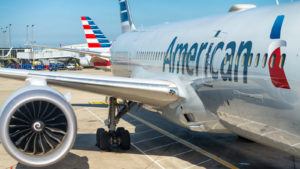With Covid-19 concerns fading and travel stocks attracting attention in today’s market, it is only natural that investors will be looking to capitalize on this opportunity. The United States just removed its travel restrictions for international travelers and other countries are following in its footsteps. The White House has announced that Dr. Anthony Fauci, the Chief Medical Advisor to the President, is hopeful about the early reports on the omicron variant. Therefore, travel stocks are trending higher due to this positive development.
U.S. President Joe Biden did not execute any fresh travel restrictions in response to the variant. According to the president, the omicron Covid-19 variant, which was recently detected in North America by scientists at the Centers for Disease Control and Prevention (CDC), is a “cause for concern, not a cause for panic.”
As a result of these developments, travel stocks are trending higher. The overarching theme is that people are fed up with sitting at home. They don’t want to be housebound and want to travel the world again. New data from Google (NASDAQ:GOOG, GOOGL) reveals that travelers are eager for travel in the wake of the Covid-19. The search engine’s analysis shows an increase in searches related to booking flights and travel packages. These are all great signs for the tourism industry, most of whom struggled to stay afloat for the better part of this year.
So, let’s look at seven stocks in the travel and tourism industry you need to keep in mind moving forward:
- Booking Holdings (NASDAQ:BKNG)
- Royal Caribbean Group (NYSE:RCL)
- Marriott International (NASDAQ:MAR)
- American Airlines Group (NASDAQ:AAL)
- Airbnb (NASDAQ:ABNB)
- Expedia Group (NASDAQ:EXPE)
- Boeing (NYSE:BA)
Travel and Tourism Stocks: Booking Holdings (BKNG)
Source: Denys Prykhodov / Shutterstock.com
Booking Holdings is a travel tech company with a finger in every pie. It operates several aggregators and metasearch engines for airfare, hotels, and rental cars. It operates several platforms such as Booking.com, Priceline.com, and Agoda.com. Over the last few months, the company has engaged in a fair share of merger and acquisition (M&A) activity. In November, Booking purchased Getaroom for $1.2 billion with the express aim to increase their collaborations and take a greater share of the travel industry market. Booking Holdings is also purchasing Etraveli Group for $1.83 billion to help offer customers an easier booking of flights with no friction or waiting time.
Meanwhile, Booking’s subsidiary Kayak, alongside Inovia Capital, led a $60 million Series C funding round for Life House. The company wants to provide independent travelers with an easy way of managing hotels.
Although the aggressive M&A activity has taken the majority of the headlines, Booking Holdings is also a solid performer in its own right. In 2021’s third quarter (Q3), room nights booked jumped for the third time in a row. Revenue came in at $4.68 billion, which is not that far removed from Q3 2019’s revenue of $5 billion. The company’s total revenue for the quarter nearly doubled, compared to last year when it was only $2.2 billion and a whopping 77% sequentially.
“We are pleased to report another quarter of sequential improvement in room night trends, which was primarily driven by better results in Europe,” Chief Executive Officer (CEO) Glenn Fogel said, commenting on the results. However, cross-border restrictions are still prevalent and international room night figures are still “significantly depressed” from pre-pandemic levels. Nevertheless, these numbers repose trust if you are looking for travel stocks.
Royal Caribbean Group (RCL)

Source: NAN728 / Shutterstock.com
When the pandemic hit, it felt like the end for cruise vacations. But thankfully, we have three companies that are still going strong: Royal Caribbean Cruises, Norwegian Cruise Line Holdings (NYSE:NCLH), and Carnival (NYSE:CCL). According to credit rating agency Moody’s, these multinational corporations lost almost $900 million monthly during this period. The industry’s best asset is its loyal customer base. Analysts are optimistic about RCL and believe that it could reach pre-pandemic levels of passengers very soon, perhaps within the next year!
The pandemic did not deter loyal customers. Instead, they converted their existing tickets into credit for future travel. In an interview with CNBC, CEO Richard Fain said bookings for next summer were exceptionally strong. The executive, who is “stepping down as CEO on Jan. 3, after more than 30 years at the helm,” said bookings for full-year 2022 sailings are within usual ranges and at more elevated prices than before the pandemic.
“That will generate the cash flow that we need to pay down the debt, to reinvest in our technology, reinvest in our sustainability efforts, reinvest in our new ships,” the executive said.
Every quarter over the past year shows a consistent uptick in performance, which is why the markets are becoming cautiously optimistic. Royal Caribbean is looking forward to returning 50 of its 61 ships by the end of the year. In reporting Q3 fiscal year 2021 results, the global cruise company reported around $457 million in revenue, a significant improvement from -$33.7 million last year. Adjusted losses per share shrunk to $5.59 versus $6.29 in the year-ago period.
Although the cruise company missed analyst estimates, the results affirmed that things are on the mend.
Travel and Tourism Stocks: Marriott International (MAR)

Source: Serjio74 / Shutterstock
Few names are as synonymous with the travel and tourism industry as Marriott. A juggernaut in its sector, Marriott reported a net income of $220 million for the most recent quarter, up from last year’s total of $100 million, but still below 2019’s $347 million.
The company has been on a mission to grow its global lodging portfolio for years and it looks like they’re finally succeeding. The addition of 114 properties with 17,456 rooms marks an impressive end-goal in three short months. The addition includes more than 2,200 conversions and 8,500 international market rooms.
Worldwide occupancy rose to 58% in Q3, and the average daily rate was only 5% below Q3 2019.
Worldwide revenue per room, or RevPAR, increased 118% for the quarter. It is a 120% increase over last year in dollars, but is still down nearly 26% compared to 2019. With the recovery from Covid-19 still in full swing, top executives from Marriott predict that this trend will continue into 2022 — despite some fluctuations like the delta variant that caused a summer dip in travel.
Marriott is investing upwards of $550 million in the next year and they’re not slowing down any time soon. The hotel chain’s total investment spending includes capital, technology expenditure, and loan advances for both acquisitions or projects at their locations worldwide.
“We expect to make substantial progress in closing the gap to 2019 RevPAR levels by the end of next year,” Chief Financial Officer (CFO) Leeny Oberg said, acknowledging “major setbacks” in pandemic recovery could still impact projections.
American Airlines Group (AAL)

Source: GagliardiPhotography / Shutterstock.com
American Airlines has seen travel pick up again in recent quarters and its Q3 earnings show why they’re one to watch out for in 2022. It reported almost $9 billion in revenue for the quarter, up 20% sequentially from last year’s second-quarter. The airline expects strong demand during peak travel periods in Q4. They expect more than 6,000 departure days on average for this period.
Q3 was a good time for American Airlines as they reported an unexpected $169 million profit. The airline received at least $5.8 billion in federal payroll support, which helped them get through this tough period and keep their operations running smoothly.
JetBlue Airways Corporation (NASDAQ:JBLU) collaborates with American Airlines to provide better service for customers in New York and Boston, including 58 new routes. They have also increased frequencies on over 130 different flight paths and are codesharing on 175 routes. American Airlines flies from New York’s John F. Kennedy International Airport (JFK) to Tel Aviv in Israel and Athens, Greece. It has also introduced a new route between JFK and Delhi, India.
In Q3, American Airlines reported revenue at around $9 billion, down about 25% from a year ago, but up compared with 2019 when they brought in $3.17 billion. The company expects its revenue to fall by about 20% in the fourth quarter of this year when it had generated $11.3 billion two years ago and capacity is also down 11%. American Airlines has predicted a complete recovery of domestic business travel by 2022.
The delta variant had a short-lived impact on results. Ticket purchases skyrocketed every time governments lifted international travel restrictions. Hence, investors are cautiously optimistic about the legacy carrier’s chances — among the sea of travel stocks — in tackling the omicron variant.
Travel and Tourism Stocks: Airbnb (ABNB)

Source: AlesiaKan / Shutterstock.com
Airbnb is a great way to find lodgings when you’re touring anywhere in the world. It has over 5 million listings in 220 countries and regions. It makes it easy for travelers of all kinds, from vacationers on their first trip abroad or college students looking to stay in someone’s home while studying overseas; people living large parts of the year elsewhere, such as globe trotters who want something different every night — Airbnb connects them all. Along the way, it makes money by charging a service fee to hosts and guests.
The company’s recovery has been attributed to the relaxation of restrictions, which have allowed more people and hosts to use Airbnb. The company posted a top-line figure of $2.24 billion during Q3, up by 67% over the year-ago period. The hospitality industry is booming, with Airbnb scoring a 29% increase over last year’s third quarter. This means that customers booked 79.7 million nights and experiences in just three months.
Despite the pandemic, the company has been seeing success, with their highest revenue and net income ever recorded during the third quarter. Despite not being back at pre-pandemic levels yet for urban or cross-border travel routes, CFO Dave Stephenson hoped current travel trends will extend to 2022.
Airbnb is likely to report fourth-quarter revenue between $1.39 billion and $1.48 million, which is in line with expectations.
Judging Airbnb stock is a tough endeavor. On the one hand, it has massive growth potential, an asset-light business model, and a solid management team. However, its stock is trading at pricey multiples. Right now, it’s enticing since it is currently down around 7% in the last month, with its price around $167 per share. But keep in mind, ABNB is an overpriced name among travel stocks. So, book your profits in the runup to major announcements and earnings.
Expedia Group (EXPE)

Expedia Group is one of the most well-known names in online travel. The company’s websites include Expedia, Vrbo, and more. They operate travel fare aggregators or metasearch engines that provide information about destinations to travelers looking for accommodation options online.
Much like the rest of the travel industry, Expedia suffered a massive downturn in income due to the Covid-19 pandemic. However, its latest results confirm that the dark days might be over. In Q3, net income came in at $362 million, a substantial uptick from a loss of $221 million last year and closer to the Q3 2019 figure of $409 million. Adjusted earnings before interest, taxes, depreciation, and amortization (EBITDA) was positive for the second quarter in a row. The third-quarter figure of $855 million signifies a year-over-year gain of 181% over the previous year’s $304 million. Revenue was $2.96 billion, increased by 97% versus the year-ago quarter of $1.5 billion and close to pre-pandemic numbers of $3.55 billion.
“Despite continued volatility in the travel recovery, Expedia Group’s net income and adjusted EBITDA for the quarter nearly matched our Q3 2019 levels driven by the superior performance from Vrbo and domestic travel along with improvements across virtually all lines of business,” Expedia CEO Peter Kern said in the earnings release. Kern believes the company will become much more aggressive with the recovery in full swing.
Travel and Tourism Stocks: Boeing (BA)

Source: vaalaa / Shutterstock
Many aviation stocks got hit hard by the pandemic. However, no one had it quite as rough as Boeing. Shares of the aviation manufacturer changed hands for more than $400 a pop in 2019. But it fell sharply below $190 at the height of the Covid-19 pandemic. The grounding of its 737 MAX airliner also did not help matters.
Boeing and Airbus (OTCMKTS:EADSY) have been rivals for years, battling it out for supremacy in the commercial passenger aircraft industry. However, Airbus has gained market share from Boeing due to the accident. The Boeing 737 Max came back in service in June. Nevertheless, it is a huge public relations disaster and will take a while to recover. In addition, Boeing has quadrupled its debt to $63.5 billion since 2019 due to the pandemic.
Just like it has been for years, Boeing is an important player in the world of aircraft manufacturing. However, it is currently suffering from crippling debt and is still reeling from the 737 MAX disaster. If you are looking for a long-term investment, BA might be for you. It is a solid enterprise with several years of experience, making it one of the best travel stocks out there. Do not invest if you are looking for quick gains, though.
On the publication date, Faizan Farooque did not have (either directly or indirectly) any positions in the securities mentioned in this article. The opinions expressed in this article are those of the writer, subject to the InvestorPlace.com Publishing Guidelines.
Faizan Farooque is a contributing author for InvestorPlace.com and numerous other financial sites. Faizan has several years of experience in analyzing the stock market and was a former data journalist at S&P Global Market Intelligence. You can check out his analysis on InvestorPlace and TipRanks.
The post 7 Travel and Tourism Stocks to Reserve Now for a Rebound in 2022 appeared first on InvestorPlace.
The views and opinions expressed herein are the views and opinions of the author and do not necessarily reflect those of Nasdaq, Inc.
Unlock the world’s wonders with unforgettable journeys tailored just for you! Whether you crave sun-kissed beaches, thrilling adventures, or rich cultural escapes, your dream destination awaits. Enjoy seamless travel with expert tips, exclusive deals, and handpicked experiences that Turn Every Trip into a lifetime memory.










